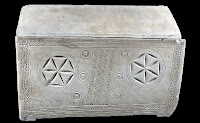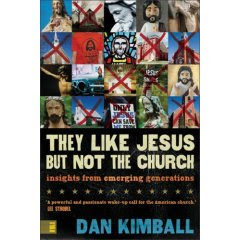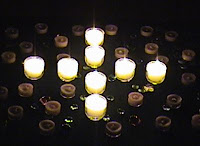I was revisiting the site of a guy I love to read & found this post called Reality Church. Its a good one, worth checking out, re-reading, pondering, & responding… perhaps even doing a “Where Am I?”
Tag Archives: Emerging
Everybody Must Get Cloned…
If you’ve ever wondered how I’ve ended up like I have, take a look at this:
Steve Taylor shaped my thinking about Christ, Christianity, & living the life of a Christ-follower, often using irreverent, sarcastic lyric/music… stuff that made me think & ask, “Now why is it we do it that way again?” And, “Is that REALLY how we’re (aka: The Machine called church) coming off? And if so, why?”
Thanks to Pat D for sending this my way – you made my day.
Defined by a label…?
Yesterday, I took a quiz I found on a blog I read – DISCLAIMER: this was a new thing for me, as I usually don’t spend my time filling out meaningless, time wasters (my own stereotype & feelings about ‘those things” inserted here.) This one, however, intrigued me, as it attempted to bring out & identify my “theological worldview” – I was intrigued because I see myself (& you) as a pretty sophisticated, complex, deep & often parodoxical person who can’t be accurately described with a label. This quiz told me that I could. It was a challenge, & I took it. Here are the results.
You scored as Evangelical Holiness/Wesleyan. You are an evangelical in the Wesleyan tradition. You believe that God’s grace enables you to choose to believe in him, even though you yourself are totally depraved. The gift of the Holy Spirit gives you assurance of your salvation, and he also enables you to live the life of obedience to which God has called us. You are influenced heavly by John Wesley and the Methodists.
|
What's your theological worldview?
created with QuizFarm.com
The Jesus Family Tomb & other musings…

The ‘idea’ that has been posited by James Cameron et al isn’t a new one IDEA – many have attempted to discredit Christ & His followers using poorly & selectively researchd “Science, Archaeology, & the thoughts Old Dead Guys.” Its the case of starting with an agenda & creating a case to try & validate it.
The Apostle Paul addressed those that were saying that there was no resurrection of the dead – they had largely based these thoughts on a belief that the physical body was inherently sinful & that only the spirit was pure – Paul points out that the resurrection of Christ is the cornerstone of the Christian faith – without which we “are the most miserable people in the world.” Loons. Delusional. To be pitied.
But that’s not the case.
1Corinthians 15:14-23
14And if Christ was not raised, then all our preaching is useless, and your trust in God is useless. 15And we apostles would all be lying about God, for we have said that God raised Christ from the grave, but that can’t be true if there is no resurrection of the dead. 16If there is no resurrection of the dead, then Christ has not been raised. 17And if Christ has not been raised, then your faith is useless, and you are still under condemnation for your sins. 18In that case, all who have died believing in Christ have perished! 19And if we have hope in Christ only for this life, we are the most miserable people in the world. 20But the fact is that Christ has been raised from the dead. He has become the first of a great harvest of those who will be raised to life again.
21So you see, just as death came into the world through a man, Adam, now the resurrection from the dead has begun through another man, Christ. 22Everyone dies because all of us are related to Adam, the first man. But all who are related to Christ, the other man, will be given new life. 23But there is an order to this resurrection: Christ was raised first; then when Christ comes back, all his people will be raised..
On that same note – take a look at the following excerpt from an article by philosopher, academic, & deep thinker Ravi Zacharias – it addresses the reality of Christ’s resurrection using the evidence of the lives of the ones who witnessed it:
One thing is historically incontestable: the disciples went to their deaths proclaiming the resurrected Christ. And it is here that it seems we are left with common sense questions. For if the disciples agreed to propagate a story, having even the slightest bit of intelligence, wouldn’t they have thought to conceive something less remarkable–perhaps a story that would accommodate the arguments they would undoubtedly face? Why wouldn’t they have come up with something unfalsifiable? If they would have only claimed that Jesus had spiritually risen again, how would the antagonists have proven them false? And in so doing, they would not have to worry about hiding the body or about what would happen to them if the body was ever discovered. Furthermore, if the disciples agreed to propagate a story, when standing up for these falsified claims became a matter of life and death wouldn’t at least a few of them have buckled?
But the disciples did not say that Jesus spiritually rose from the dead, and nor did they back down when the time came to stake their lives on it. They took the dangerous road–indeed, the inconceivable road–and they not only went to great lengths to proclaim that Jesus bodily rose from the dead, but they went to their deaths proclaiming it was true. Now why would they risk everything proclaiming the actual, physical resurrection of Jesus Christ from the dead if they knew it was a lie?
You can read the entire article at this link:
reading…

I’ve got a stack of books awaiting my attention – last count I had 12 ‘must-reads’ on the shelf behind my desk… this is officially the ‘waiting room’ for my books/next reads.
I’m 2/3 of the way through THEY LIKE JESUS by Dan Kimball – I believe that this book should be required reading for any/all people that are a) Christ-followers & b) have a desire to live in such a way as to reflect Christ to the people that they come in contact with.
Actualy, when they make me King, Emperor, Dominar, or Guy in Charge of Assigning Reading, I would give this book to every pastor (vocational or otherwise) in any & every Christian church – with a mandatory “Response Paper” to be written afterwards. The paper should be 3-5 pages, & would:
-Address Kimball’s thesis: People like Jesus, but they don’t like the church – Why does Kimball say this? What are your observations of pre-Christians? What are your responses to these observations (his & yours)?
-Describe your “philosophy of ministry” – briefly explain the “WHY’s” (reasoning, values, beliefs) behind the “WHAT’s” (actions, behaviors, personal schedules, programs) of the ministry you are involved in.
-What does it mean to be missional? Describe the WHY’s & the WHAT’s of you being missional.
Then, we’d all get together in small groups (5-8 people) & discuss what we wrote & why… with the intent being on taking action towards leading a community in living out Jesus.
For inquiring minds:
Dan Kimball Blog
Emergent Church Clone Questions…
I found this 6 month old article on a blog of a guy I like to read. In it, he ‘enters the conversation’ on a trend in emergent churches – when they plant, they franchise (my word, not his…), so that the ‘new church’ looks, sounds, & smells like the sending church vs. taking on the characteristics of the people that end up coming to the church…
Reminiscent of this one? EVERGREEN
Thoughts? Responses? Does anybody really KNOW what time it is?
Post-modern, emerging, emergent – somebody did some homework…

Heard a friend describe his church as a “post-modern, emerging-type church, with lots of symbolism, candles, & coffee.” Got me thinking, which got me looking, which got me questioning…
What is the “Emerging Church?” What makes a church “Emergent?” Is there such a thing as a post-modern “style” of church? If so, is this “style” going to go/already heading towards extinction?
Found THIS ARTICLE by Scot McKnight– great & insightful primer on the “emerging, emergent, post-modern” – deals with the mystique, mythology, misconceptions, & other mis’ses…
excerpt…
Five Streams of the Emerging Church
Key elements of the most controversial and misunderstood movement in the church today.
Scot McKnight | posted 1/19/2007 08:46AM
It is said that emerging Christians confess their faith like mainliners—meaning they say things publicly they don’t really believe. They drink like Southern Baptists—meaning, to adapt some words from Mark Twain, they are teetotalers when it is judicious. They talk like Catholics—meaning they cuss and use naughty words. They evangelize and theologize like the Reformed—meaning they rarely evangelize, yet theologize all the time. They worship like charismatics—meaning with their whole bodies, some parts tattooed. They vote like Episcopalians—meaning they eat, drink, and sleep on their left side. And, they deny the truth—meaning they’ve got a latte-soaked copy of Derrida in their smoke- and beer-stained backpacks.
Along with unfair stereotypes of other traditions, such are the urban legends surrounding the emerging church—one of the most controversial and misunderstood movements today. As a theologian, I have studied the movement and interacted with its key leaders for years—even more, I happily consider myself part of this movement or “conversation.” As an evangelical, I’ve had my concerns, but overall I think what emerging Christians bring to the table is vital for the overall health of the church…
